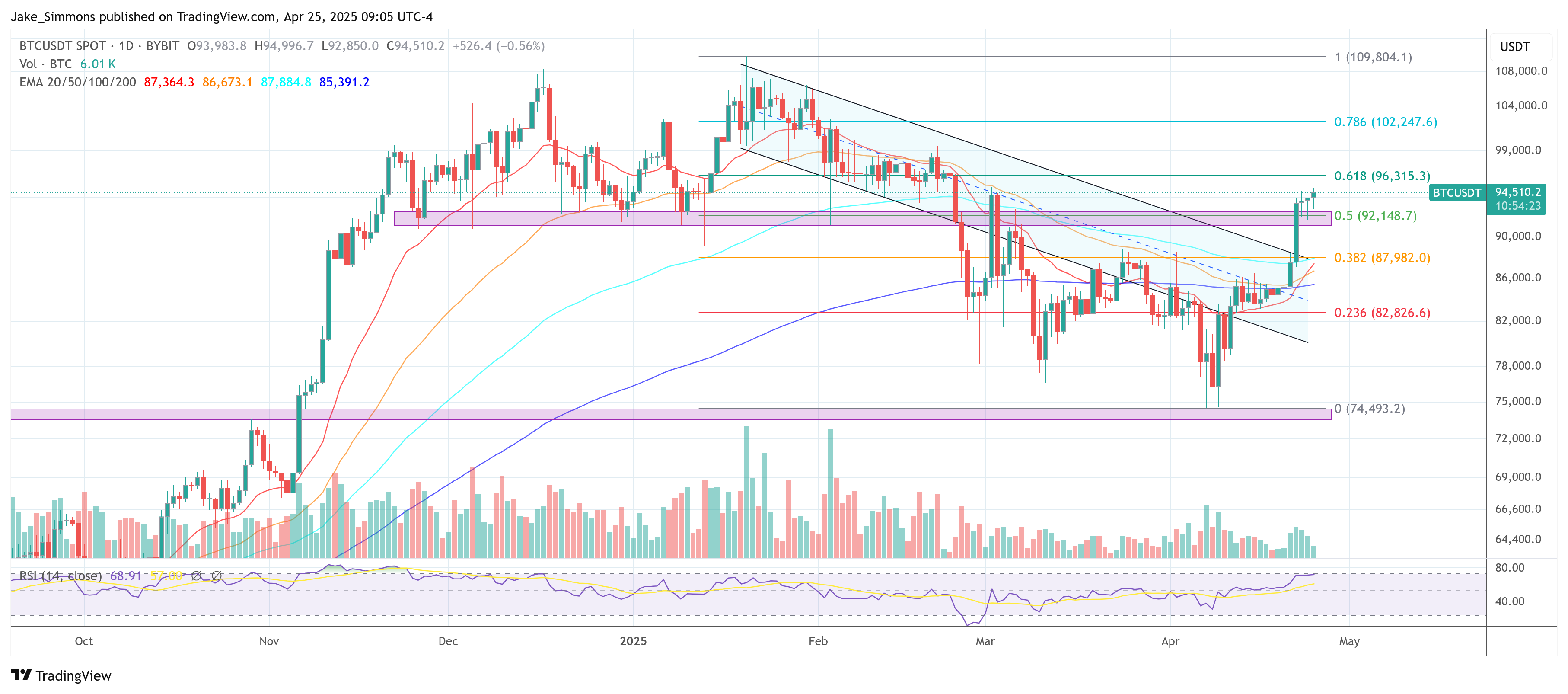Bitcoin must be valued as “an uncorrelated asset that advantages when the world will get messier,” BlackRock’s US Head of Fairness ETFs Jay Jacobs advised CNBC in an interview on Thursday.
“Crypto over the long term is decoupled from US tech shares,” Jacobs mentioned, stressing that short-term market stress can masks the distinction however that “the long-term correlation between US shares and Bitcoin is extra like two or three %.” He argued that what pushes equities larger—“larger development, larger certainty, decrease geopolitical danger”—is the mirror picture of the forces that transfer Bitcoin. “Bitcoin thrives when you’ve gotten extra uncertainty and are searching for one thing that’s going to behave in a different way, so essentially they need to behave like an uncorrelated asset.”
BTC was altering palms slightly below $94,000 throughout Jacobs’ look, extending a rally that has added roughly 150% since spot-ETF approvals early final yr.
Bitcoin Rises As a result of Of ‘Mega-Forces”
Jacobs tied worth behaviour on to flows. “We might assume over the long run, if this trajectory of better uncertainty around the globe continues, issues like gold and Bitcoin ought to proceed to go up.” He famous that traders are repositioning accordingly: “We’ve seen important inflows into gold ETFs; we’ve seen important inflows into Bitcoin, and that is all as a result of individuals are searching for these property that may behave in a different way.”
The largest beneficiary has been BlackRock’s personal iShares Bitcoin Belief (IBIT), which on 23 April absorbed $643 million of internet creations—its largest one-day haul since January—lifting the fund’s property to roughly $54 billion.
Jacobs framed the frenzy into onerous property as a part of an extended geopolitical realignment. “In the event you have a look at central banks around the globe, a continued motion in the direction of diversification past simply holding {dollars} is one thing that’s been taking place for many years… the swap from simply holding {dollars} to holding gold to taking a look at different forms of property like Bitcoin is a pattern that’s been years within the making.”
Central-bank gold purchases illustrate the shift: internet shopping for topped 1,044 tonnes in 2024, the third consecutive yr above the thousand-tonne mark, double the typical of the earlier decade.
He linked these reserve strikes to BlackRock’s 2023 “mega-forces” framework, which recognized geopolitical fragmentation as a secular driver of returns. “That mega power is materialising in insurance policies like reshoring in the USA and, I believe, straight associated to that fragmentation has been the rise of issues like Bitcoin, as individuals see extra destabilisation in geopolitics ensuing within the want for extra different property.”
BlackRock’s affect is troublesome to overstate: the agency ended the primary quarter with a document $11.6 trillion beneath administration.
By pairing that scale with a public thesis that Bitcoin’s truthful worth rises as uncertainty deepens, the asset-manager is successfully codifying a valuation mannequin by which shortage and sanction-resistance—not discounted money flows—set the marginal worth.
As Jacobs put it, the market is “searching for options—elements of the portfolio which might be going to behave individually from shares and bonds.” With IBIT now swallowing extra BTC every day than miners can produce post-halving, his remarks could provide the clearest blueprint but for the way the world’s largest asset supervisor thinks about pricing the world’s largest cryptocurrency.
At press time, BTC traded at $94,510.

Featured picture created with DALL.E, chart from TradingView.com








